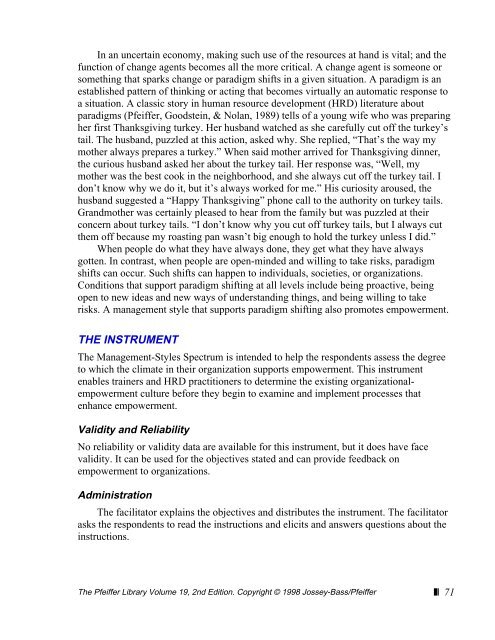motivational analysis of organizations
motivational analysis of organizations
motivational analysis of organizations
Create successful ePaper yourself
Turn your PDF publications into a flip-book with our unique Google optimized e-Paper software.
In an uncertain economy, making such use <strong>of</strong> the resources at hand is vital; and the<br />
function <strong>of</strong> change agents becomes all the more critical. A change agent is someone or<br />
something that sparks change or paradigm shifts in a given situation. A paradigm is an<br />
established pattern <strong>of</strong> thinking or acting that becomes virtually an automatic response to<br />
a situation. A classic story in human resource development (HRD) literature about<br />
paradigms (Pfeiffer, Goodstein, & Nolan, 1989) tells <strong>of</strong> a young wife who was preparing<br />
her first Thanksgiving turkey. Her husband watched as she carefully cut <strong>of</strong>f the turkey’s<br />
tail. The husband, puzzled at this action, asked why. She replied, “That’s the way my<br />
mother always prepares a turkey.” When said mother arrived for Thanksgiving dinner,<br />
the curious husband asked her about the turkey tail. Her response was, “Well, my<br />
mother was the best cook in the neighborhood, and she always cut <strong>of</strong>f the turkey tail. I<br />
don’t know why we do it, but it’s always worked for me.” His curiosity aroused, the<br />
husband suggested a “Happy Thanksgiving” phone call to the authority on turkey tails.<br />
Grandmother was certainly pleased to hear from the family but was puzzled at their<br />
concern about turkey tails. “I don’t know why you cut <strong>of</strong>f turkey tails, but I always cut<br />
them <strong>of</strong>f because my roasting pan wasn’t big enough to hold the turkey unless I did.”<br />
When people do what they have always done, they get what they have always<br />
gotten. In contrast, when people are open-minded and willing to take risks, paradigm<br />
shifts can occur. Such shifts can happen to individuals, societies, or <strong>organizations</strong>.<br />
Conditions that support paradigm shifting at all levels include being proactive, being<br />
open to new ideas and new ways <strong>of</strong> understanding things, and being willing to take<br />
risks. A management style that supports paradigm shifting also promotes empowerment.<br />
THE INSTRUMENT<br />
The Management-Styles Spectrum is intended to help the respondents assess the degree<br />
to which the climate in their organization supports empowerment. This instrument<br />
enables trainers and HRD practitioners to determine the existing organizationalempowerment<br />
culture before they begin to examine and implement processes that<br />
enhance empowerment.<br />
Validity and Reliability<br />
No reliability or validity data are available for this instrument, but it does have face<br />
validity. It can be used for the objectives stated and can provide feedback on<br />
empowerment to <strong>organizations</strong>.<br />
Administration<br />
The facilitator explains the objectives and distributes the instrument. The facilitator<br />
asks the respondents to read the instructions and elicits and answers questions about the<br />
instructions.<br />
The Pfeiffer Library Volume 19, 2nd Edition. Copyright © 1998 Jossey-Bass/Pfeiffer ❚❘ 71

















